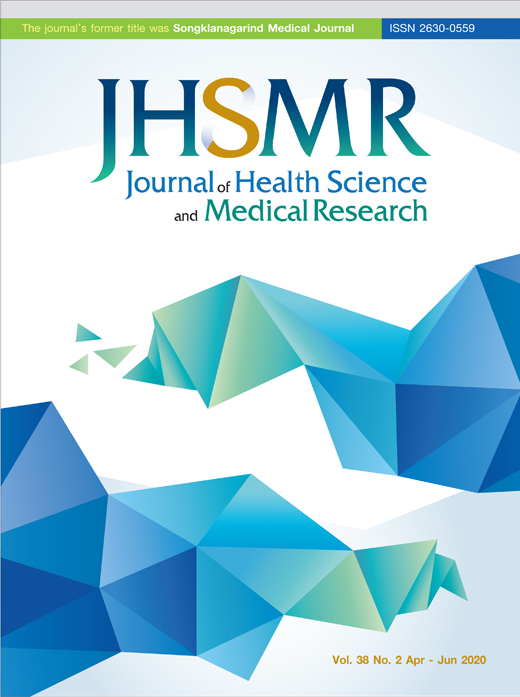The Functional Tests after ACL Reconstruction with and without Meniscal Repair
DOI:
https://doi.org/10.31584/jhsmr.2020726Keywords:
ACLR, functional tests, limb symmetry index, meniscal repair, rehabilitationAbstract
Objective: This study aims to compare the functional tests after anterior cruciate ligament reconstruction (ACLR) with and without meniscal repair after the rehabilitation program and before returning to sports.
Material and Methods: Patients who underwent ACLR using hamstring tendon autograft during 2016-2017 were invited to participate in this study and divided into 2 groups including with and without meniscal repairs according to the surgical reports. A group of ACLR with meniscal repair required the conservative anterior cruciate ligament (ACL) rehabilitation program because the non-weight-bearing approach should be applied during the first 6 weeks. These patients were followed up clinically until the rehabilitation program finished. The functional tests were applied with the 4 single-leg hop tests, as reported in the limb symmetry index (LSI).
Results: Forty-three patients were enrolled in the program. These patients were divided into 2 groups: ACLR with meniscal repair (n=20) and ACLR without meniscal repair (n=23). It was found that there was no statistically significant difference between the two groups with respect to duration for completing the rehabilitation program (p-value=0.38). Also, there was no statistically significant difference between the two groups with respect to the LSI of all 4 singleleg hop tests of duration for completing the rehabilitation program.
Conclusion: The conservative ACL rehabilitation program after meniscal repair surgery did not affect the function tests in terms of duration for completing the rehabilitation program before return to sports (RTS).
References
Lepley LK, Wojtys EM, Palmieri-Smith RM. Does concomitant meniscectomy or meniscal repair affect the recovery of quadriceps function post ACL reconstruction?. Knee Surg Sports Traumatol Arthrosc 2015;23:2756-61.
Cavanaugh JT, Killian SE. Rehabilitation following meniscal repair. Curr Rev Musculoskelet Med 2012;5:46–58.
Hart JM, Pietrosimone B, Hertel J, Ingersoll CD. Quadriceps activation following knee injuries: a systematic review J Athl Train 2010;45:87–97.
Sueyoshi T, Nakahata A, Emoto G, Yuasa T. Single-leg hop test performance and isokinetic knee strength after anterior cruciate ligament reconstruction in athletes. Orthop J Sports Med 2017;5. doi: 10.1177/2325967117739811.
Reid A, Birmingham TB, Stratford PW, Alcock GK, Giffin JR. Hop testing provides a reliable and valid outcome measure during rehabilitation after anterior cruciate ligament reconstruction. Phys Ther 2007;87:337-49.
Abrams GD, Harris JD, Gupta AK, McCormick FM, Bush-Joseph CA, Verma NN, et al. Functional performance testing after anterior cruciate ligament reconstruction a systematic review. Orthop J Sports Med 2014;2. doi: 10.1177/2325967113518305.
Noyes FR, Barber SD, Mangine RE. Abnormal lower limbsymmetry determined by function hop tests after anterior cruciate ligament rupture. Am J Sports Med 1991;19:513-8.
D’amato M, Bach BR. Knee injuries. In: Brotzman SB, Wilk KE, editors. Handbook of orthopaedic rehabilitation. 2nd ed. Philadelphia: Mosby Elsevier; 2007;p.375-486.
Baltaci G, Yilmaz G, Atay AO. The outcomes of anterior cruciate ligament reconstructed and rehabilitated knees versus healthy knees: a functional comparison. Acta Orthop Traumatol Turc 2012;46:186-95.
Logerstedt D, Grindem H, Lynch A, Eitzen I, Engebretsen L, Risberg MA, et al. Single-legged hop tests as predictors of self-reported knee function after anterior cruciate ligament reconstruction. Am J Sports Med 2012;40:2348-56.
Grindem H, Logerstedt D, Eitzen I, Moksnes H, Axe MJ, Snyder-Mackler L, et al. Single-legged hop tests as predictors of self-reported knee function in non operatively treated individuals with anterior cruciate ligament injury. Am J Sports Med 2011;39:2347–54.
Polit DF, Hungler BP. Nursing research: principles and methods. 5th ed. Philadelphia: JB Lippincott; 1995.
Hall MP, Paik RS, Ware AJ, Mohr KJ, Limpisvasti O. Neuro-muscular evaluation with single-leg squat test at 6 months after anterior cruciate ligament reconstruction. Orthop J Sports Med 2015;3. doi:10.1177/2325967115575900.
Shelbourne KD, Gray T. Results of anterior cruciate ligament reconstruction based on meniscus and articular cartilage status at the time of surgery. Five- to fifteen-year evaluations. Am J Sports Med 2000;28:446–52.
Senorski EH, Svantesson E, Beischer S, Thomee C, Grassi A, Krupic F, et al. Concomitant injuries may not reduce the likelihood of achieving symmetrical muscle function one year after anterior cruciate ligament reconstruction: a prospective observational study based on 263 patients. Knee Surg Sports Traumatol Arthrosc 2018;26:2966–77.
























